How much does your educational institution filter the internet, especially if you’re at tertiary level (because K-12 filtering has other issues attached to it)? I ask because in my recent shift to Curtin, I’ve discovered the joys of university-level internet filter, something that didn’t happen at my previous institution. The list of blocked or click-thru site (ie not completely blocked, but having a warning message asking if you really need this website) seems to alter week to week. This morning, every time I want to visit Twitter, Plurk, Facebook or even a wordpress.com blog, I have to click through a warning page; every time I reload, I have to click through a warning page. Apart from being highly frustrating, I’m currently redesigning several units which are thematically linked by the concept of web presence; almost everything I want students to look at will have these warnings on the Curtin network. I wonder how many students will get frustrated and give up on the unit? This morning’s blocks so far …
Ironic Update: The first attempt to upload this blog post from my work computer led me to discover that even this website is blocked now:
I wonder what sort of hoops I’m going to have to jump through to try and fix this? 🙁
Update 2: Most of the blocking seems to have magically stopped as suddenly as it began about 12 hours ago so, being generous, I’d like to believe this was an accidental blocking … I’d really like to believe that …
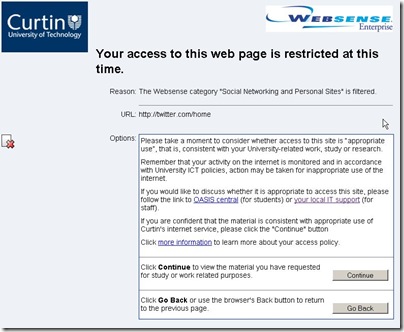
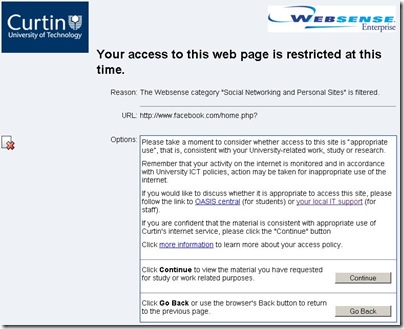
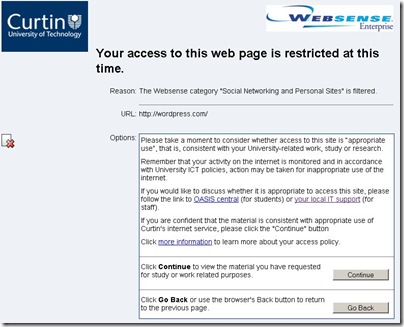
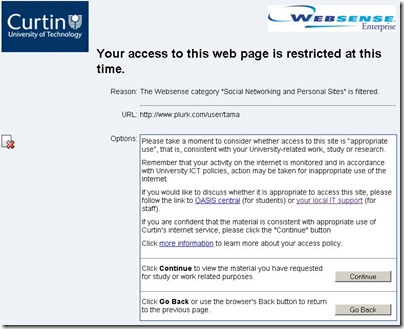
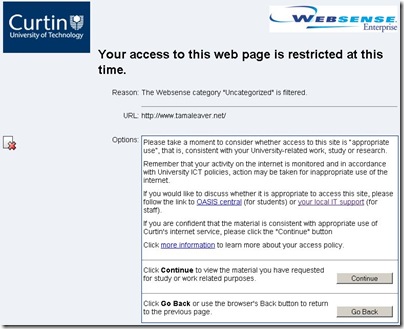


My new university now blocks/filters most social networking websites and even my blog http://is.gd/oOri and a “tech university” at that 🙁
I was just getting ready to email and complain about this, but I think your web post did the trick as Twitter at least seems to be unblocked again… 😀
UWA on the other hand seems to be completely unblocked. They may filter but I have yet to stumble on anything. Facebook, Youtube, gaming and gambling sites and even porn are all accessible.
I would guess they rely on stringent download limit restrictions and only police when they get complaints.
That’s awful! I notice that they’re using Websense categories to filter things – but blocking ALL “social network and personal” sites, not to mention all “uncategorised sites” seems rather extreme. The categories seem kind of scary, too. Abortion-related sites are a category, for instance. I wonder if there are other uses for Websense’s categories apart from censorship?
I did notice when I was at UWA that although they didn’t filter anything there seemed to be a lot of concern about bandwidth use. I think the user agreement stressed that I wasn’t supposed to be using the Internet frivolously? Was there even a bandwidth limit? I think students have to pay for internet usage over a certain amount, don’t they? I was surprised, because I’ve never heard bandwidth discussed as an issue at universities in Norway.
I wonder if there are structural differences – perhaps the connections from Australia to other continents are not as good as they should be? Perhaps Norway’s got better infrastructure or international connections and therefore bandwidth is cheaper? Or perhaps it’s financial – I don’t know, but maybe Norwegian universities’ bandwidth costs are covered directly by another agency, whereas Australian universities have to cover the costs from their own budgets?
I suppose I could try and google and find out but I’ve got to prep a talk instead!
Hi Jill,
I think many Australian universities do get charged more for internet access (mainly via Aarnet). However, I suspect this is a cost many institutions would be willing to cover – is the US, I suspect the massive fees probably cover costs and in a lot of Europe there still seems to be a core focus on education costing as little as possible. I could be getting cynical, but Australia has always seems a bit out of step on this front. 🙁 That said, the internal networks in Australia are notoriously slow and recent attempts to fix that haven’t resulted in any actually changes yet!
On the Websense front, it’s hard to imagine that their level of categorisation isn’t being used maliciously or heavy-handedly in lots of different situations!
Bandwidth costs in Australia are particul;arly large because the connections to the rest of the world are very expensive to maintain, the population is small and the providers are few. high start up costs + little competition + small amount of customers = expensive connections for Australians.
As a result everything in Australia is very steeply download limit restricted as the costs baloon. This is especially the case for universities because students use the Internet voraciously.
Often content filters are put in place to help limit costs by directing students to services that limit download usage. This seems to be part of the reason for Curtin’s content filter restrictions but there seems to be something more as well.
I am of the opinion that strict download limits are sufficient. The university should be only trying to limit costs, not limit information.
Filtering the internet at tertiary level is offensive. It sends a strong message that the university believes that adults, who have reached the level of education required to study at a tertiary level are not mature enough to judge for themselves what is appropriate material online; it’s very offensive. Perhaps Curtin is trying to protect the “innocence” of international students… Isn’t that racism?
Considering the cost of bandwidth in Australia from ISPs approx $90 pm for 240GB of peak time data, this means the university is paying less than 37.5c/ GB on a commercial connection. If this is the case, then why are Curtin students limited to 1GB quota a month? Local Curtin students pay approx $5K a semester and international students 4X that; within that, isn’t there more than a few cents allocated for internet for a student each month? Curtin is a university notorious for hating its students. This semester they cancelled Octoberfest and increased the cost of parking permits by 50%. Next semester I hear they are considering charging 50c/ hour for student parking. As a Curtin student, I’m very disappointed in my university; like I said, Curtin hates their students. I think I’ll switch to UWA after this semester, sounds like they have a stronger student voice than at Curtin.
Hi Joshua,
I don’t think filtering is racism; it’s more about legal protection from the university’s corporate perspective, I think.
There’s more info about why uni bandwidth costs are higher than commercial services in the comments above. I’m sure you’re right that a lot of students would be happy to have higher bandwidth allowances (some students do get more if there are specific needs in units they take). Beyond that, I really don’t think it’s fair to say Curtin hates its students, but I do empathise with parking issues! 🙄